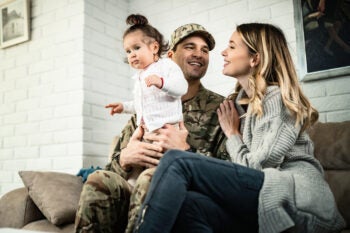Home / Health & Wellness Articles / Military Archives /
The Role of Self-Care in PTSD Recovery

Post-traumatic stress disorder (PTSD) is a mental health condition that can develop after living through an unresolved traumatic event or a threatening situation that impacts a person’s ability to cope or function. PTSD can have a profound effect on military service members and veterans significantly impacting their daily lives, relationships, and overall well-being. While treatment options like therapy and medication are important, self-care can also play a powerful role in managing PTSD symptoms. Simple, intentional self-care practices can help veterans feel more grounded and regain a sense of control.
“For many veterans with PTSD, there really isn’t any part of their life that’s not affected by it,” says Rachel Dibbins-Boshers, Therapist at Centerstone. “PTSD is sometimes referred to as being stuck in recovery. When we go through something traumatic, our brains can have a hard time processing it. So, what happens for a lot of people is that, as the brain tries to make sense of it, we get reminded of it in different ways in multiple areas of our lives,” she adds.
In the military community, there is significant value placed on selfless service and taking care of others, so the idea of self-care remains somewhat taboo and can feel uncomfortable for some. It can be hard for veterans to understand the importance of self-care and how effortless it is to do. It can be something as simple as going for a walk or connecting with a friend. “When we talk about self-care, I think we have to first recognize that we are struggling in some way, shape, or form to understand that we need it,” Dibbins-Boshers adds. “There can be a limited capacity for a lot of veterans to have the emotional awareness to say, ‘I’m not doing well; I need to do something to take care of myself’ because that isn’t necessarily something they are taught to do.” To reframe this narrative, ask yourself what you used to enjoy that you aren’t doing anymore. So many times, the things that used to bring you joy are actually a form of self-care.
When it comes to finding self-care practices that work best, Dibbins-Boshers recommends starting with the basics. When the body enters a state of hyper-arousal, or fight or flight, during PTSD it can interfere with basic daily functioning, like hygiene, sleep, and nutrition.
Having a support system as you navigate your self-care journey is crucial. Though it may feel uncomfortable, don’t be afraid to ask for help. Whether it’s help paying bills, clean laundry, or enough food, having your basic needs met can relieve your stress and allow you to focus on doing something positive for yourself.
Incorporating self-care into daily life can make a meaningful difference for veterans living with PTSD. These practices can complement professional treatment, help reduce the intensity of symptoms, and promote a greater sense of well-being. By prioritizing self-care, veterans can take an active role in their healing and build resilience for the road ahead.
As you start to explore what self-care looks like for you, you may need or want someone there as you navigate the process. Trying something new, or trying something for the first time in a long time, can be intimidating.
If you need additional support navigating your journey with PTSD, Centerstone’s Military Services team is here for you. Learn more about how we can help you heal today.


